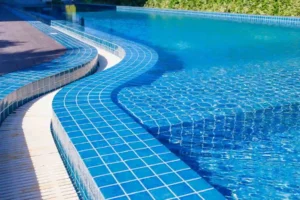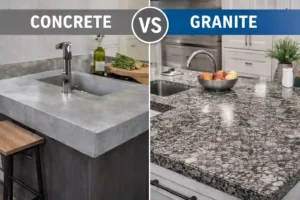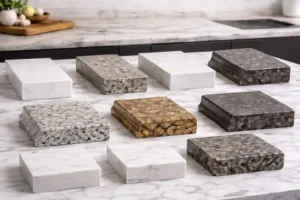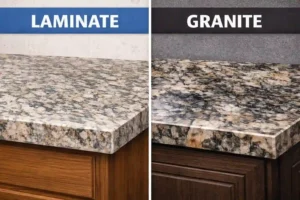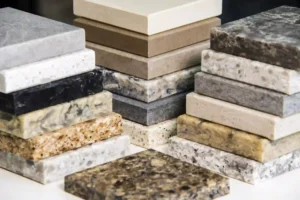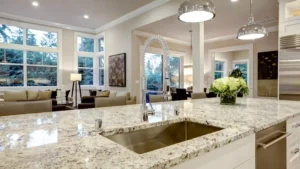Marble has long been a symbol of luxury and elegance in home design, but it comes with its own set of challenges, such as high maintenance and susceptibility to stains and scratches. For those who love the look of marble but want a more durable and low-maintenance option, quartz countertops that look like marble are an excellent choice. This guide will explore everything you need to know about quartz countertops that look like marble, including their benefits, how they compare to real marble, and why they have become a popular choice among homeowners. SF Marble Granite is proud to offer a wide range of these stunning and practical surfaces.
What is a Quartz Countertop?
Quartz countertops are engineered stone surfaces made from natural quartz crystals and resins. The process involves crushing natural quartz, one of the hardest minerals on earth, and mixing it with a small amount of polymer resins and pigments to create a durable and versatile countertop material. This manufacturing process allows for a wide variety of colors and patterns, including those that mimic the look of natural marble.
Table of Contents
ToggleQuartz countertops that look like marble have gained popularity due to their ability to offer the aesthetic appeal of marble without the associated drawbacks. Brands like SF Marble Granite have perfected the art of creating these beautiful and practical surfaces, ensuring that homeowners can enjoy the luxurious look of marble with the added benefits of quartz.
Strengths and Weaknesses of Quartz Countertops
Given are the strengths and weaknesses of Quartz Countertops:

Strengths
Durability
Quartz is one of the hardest materials available, making it highly resistant to scratches, chips, and cracks. This durability is especially beneficial in high-traffic areas like kitchens and bathrooms.
Low Maintenance
Unlike natural marble, white quartz countertops are non-porous, which means they do not require sealing and are resistant to stains. A simple wipe with a mild detergent and water is usually enough to keep them clean.
Consistency
Because quartz countertops are engineered, they offer a consistent appearance, free from marble’s natural variations and imperfections.
Variety
With advancements in manufacturing technology, Taj Mahal quartzite countertops can replicate the look of marble with remarkable accuracy. SF Marble Granite offers a wide range of designs, from subtle veining to bold patterns that closely resemble various types of marble.
Hygiene
The non-porous nature of quartz makes it resistant to bacteria and mold, making it a hygienic choice for kitchen countertops.
Weaknesses
Heat Sensitivity
Quartz countertops are resistant to heat but can be damaged by prolonged exposure to high temperatures. It is advisable to use trivets or hot pads to protect the surface.
Cost
While generally more affordable than high-end marble, quartz countertops can still be expensive compared to other countertop materials.
Weight
Quartz countertops are heavy, requiring sturdy cabinetry and professional installation to ensure they are properly supported.
What are Advantages of Quartz Over Marble
When comparing quartz countertops that look like marble to actual marble, several advantages make quartz a more practical choice for many homeowners.
Durability and Maintenance
As mentioned earlier, quartz is more durable and requires less maintenance than marble. Marble is prone to staining from acidic substances like wine, coffee, and citrus, and it needs regular sealing to maintain its appearance. Quartz, being non-porous, is resistant to stains and does not require sealing.
Consistency in Appearance
Natural marble has unique veining and patterns, which means no two slabs are identical. While this uniqueness is appealing to some, it can be a drawback for those who prefer a more uniform look. Quartz countertops can be manufactured to have a consistent appearance, ensuring that the design you choose is the design you get.
Environmental Impact
Quartz countertops are often considered more environmentally friendly than marble because they are made from abundant natural quartz and can include recycled materials. Additionally, the production process for quartz countertops typically generates less waste compared to quarrying and transporting natural marble.
Cost
While both materials can be costly, quartz countertops that look like marble are often more affordable than premium marble. This makes quartz a cost-effective option for those who desire the luxurious look of marble without the high price tag.
Difference between Real Marble vs Quartz That Looks Like Marble Countertops
When choosing countertops for your kitchen or bathroom, you might be considering the elegant look of marble but are unsure whether to go with real marble or quartz that mimics marble. Both options have their pros and cons, and understanding the differences can help you make an informed decision. Here, we’ll explore the key distinctions between real marble and quartz countertops that look like marble.
Real Marble Countertops
Natural Beauty and Uniqueness
- Marble is a natural stone formed from limestone under intense heat and pressure.
- Each marble slab is unique, with its distinct veining and coloration.
- The natural variations give marble an unparalleled aesthetic appeal.
Classic Elegance
- Marble has been used for centuries in architecture and sculpture, lending a timeless, classic look to any space.
- The luxurious appearance of marble can elevate the overall design of your kitchen or bathroom.
Surface Durability
- While marble is durable, it is softer than some other natural stones like granite.
- It is prone to scratching, etching, and chipping, particularly in high-traffic areas.
Porosity and Staining
- Marble is a porous material, meaning it can absorb liquids and stain easily.
- Regular sealing is required to protect the surface from spills and moisture.
Maintenance
- Marble requires more maintenance compared to quartz.
- Spills, especially acidic substances like lemon juice or vinegar, should be wiped up immediately to prevent etching.
- Regular sealing is necessary to maintain its appearance and protect it from stains.
Quartz Countertops That Look Like Marble
Engineered Stone
- Quartz countertops are engineered stone made from about 90-95% ground quartz and 5-10% resins and pigments.
- This manufacturing process allows for a wide variety of designs, including those that closely mimic the look of natural marble.
Consistency in Appearance
- Unlike natural marble, quartz countertops have consistent patterns and colors.
- This uniformity can be advantageous if you prefer a more controlled and predictable look.
Durability
- Quartz is one of the hardest minerals on earth, making quartz countertops extremely durable.
- They are highly resistant to scratches, chips, and cracks, which is ideal for high-traffic areas.
Non-Porous Surface
- Quartz is non-porous, meaning it doesn’t absorb liquids and is resistant to staining.
- This feature makes quartz countertops more hygienic and easier to maintain compared to marble.
Low Maintenance
- Quartz countertops require minimal maintenance.
- They do not need to be sealed and can be cleaned with mild soap and water.
- The non-porous nature of quartz also means it is resistant to bacteria and mold growth.
Heat Resistance
- While quartz is generally heat-resistant, it is not entirely impervious to high temperatures.
- It is advisable to use trivets or hot pads to protect the surface from hot pots and pans.
Cost Comparison
Real Marble
- Marble is typically more expensive than quartz due to its natural origin and the cost of quarrying and transporting the stone.
- The price can vary widely depending on the type, rarity, and origin of the marble.
Quartz
- Quartz countertops can be more affordable than high-end marble, but prices can vary depending on the brand, design, and quality.
- Custom designs or quartz slabs that closely mimic rare marble types can be more expensive.
Environmental Impact
Real Marble
- Marble quarrying can have significant environmental impacts, including habitat destruction and carbon emissions from transportation.
- However, natural stone is a long-lasting material, which can be a more sustainable choice if sourced responsibly.
Quartz
- The production of quartz countertops involves the use of resins and synthetic materials, which can have environmental implications.
- Some manufacturers are taking steps to reduce their environmental footprint by using recycled materials and eco-friendly practices.
A Perfect Blend of Beauty and Durability of Quartz Countertops
Quartz countertops that look like marble offer breathtaking veining and color consistency, all while being non-porous to resist stains and bacterial growth for a hygienic kitchen surface. Made from about 90–95% natural quartz mixed with resins, these engineered stone surfaces deliver exceptional durability and scratch resistance, standing up to daily wear without chipping or cracking. Homeowners love them for their low-maintenance appeal, requiring nothing more than a quick wipe with mild soap and water no sealing necessary so you can spend more time cooking and less time cleaning. Ready to bring the look of luxury marble to your space? Trust our expert Countertops Installation in Lowell team to fabricate and install your quartz countertops flawlessly, ensuring a seamless result that enhances both your home’s style and functionality.
Conclusion
Choosing between real marble and quartz that look like marble depends on your priorities. If you value natural beauty, uniqueness, and a timeless look, real marble might be the right choice for you. However, if you prefer durability, low maintenance, and a consistent appearance, quartz countertops that mimic marble can be an excellent alternative. Consider your lifestyle, budget, and aesthetic preferences when making your decision, and you’ll find the perfect countertop to enhance your space.
For high-quality countertops, contact us at 978-459-5823 or visit 755 Dutton St., Lowell, MA 01854. SF Marble Granite is your #1 choice for quality granite countertops in Lowell.
FAQs
Are quartz countertops that look like marble heat resistant?
Quartz is heat resistant up to a point but can suffer damage from sudden high heat; always use trivets to protect your surface from hot pots and pans. Most brands recommend avoiding direct contact with temperatures above 150 °C to maintain color and integrity.
How do quartz countertops compare to real marble in terms of cost?
Quartz countertops generally cost between $55 and $75 per square foot, making them more affordable than premium marble which can range from $75 to $150 per square foot. This cost-effective pricing, combined with quartz’s durability and low upkeep, makes it a popular choice for modern kitchens.
Do quartz countertops require sealing like marble?
Unlike porous marble, quartz countertops are non-porous and do not require sealing, saving you the time and expense of annual maintenance. A simple routine of wiping with mild detergent and water keeps your quartz surface looking pristine for years.

